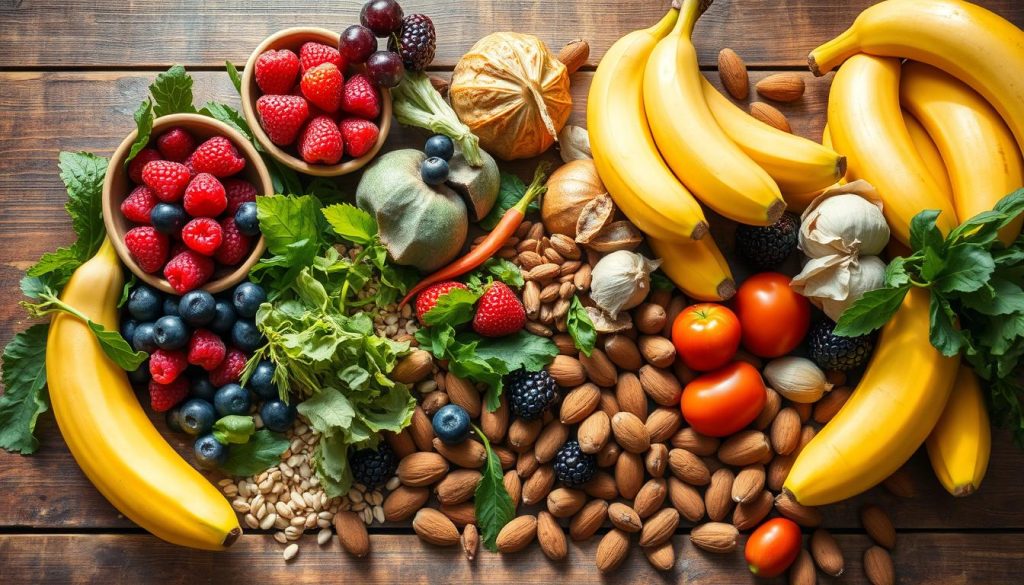Can changing what we eat help us feel better emotionally? Research shows that diet and mood are closely linked. People who struggle to get enough food may feel anxious or depressed up to 3.6 times more. This highlights how important food is for our mental health.
Our diet affects our mood by controlling neurotransmitters and supporting gut health. By learning about this connection, we can improve our mental state with simple diet changes. Let’s explore how diet impacts mood and find ways to boost our emotional well-being.
Key Takeaways
- Poor nutrition is associated with increased risk of anxiety, depression, and other mental health issues.
- The gut-brain axis plays a crucial role in mood regulation, with the gut producing 90% of the body’s serotonin.
- Consuming a balanced diet rich in fruits, vegetables, whole grains, and lean proteins can support positive mental well-being.
- Specific nutrients like omega-3 fatty acids, B vitamins, and iron are particularly important for cognitive function and mood stability.
- Irregular eating patterns and excessive consumption of processed, high-sugar foods can negatively impact emotional state.
Understanding the Diet-Mood Relationship
The link between food and mental health is both interesting and complex. Some foods can instantly boost our mood, while others can harm our emotional health over time. The science behind this diet-mood relationship reveals the intricate processes involved.
The Science Behind Food’s Impact on Emotions
Our brain chemistry is key to our mood. Foods rich in omega-3s, vitamins, and antioxidants can help balance our brain chemicals like serotonin and dopamine. On the other hand, diets full of processed foods, refined carbs, and sugars can cause inflammation, upsetting our brain chemistry.
Why What We Eat Matters for Mental Health
The connection between our gut and brain is vital for understanding diet’s impact on mood. Our gut microbiome, a community of bacteria in our gut, affects our brain and mood. Eating a variety of whole foods supports a healthy gut and better mental health.
The Role of Brain Chemistry
Keeping our blood sugar stable is important for mood. Blood sugar spikes and drops can make us feel irritable, anxious, and tired. Eating foods with complex carbs, fiber, and lean proteins helps balance our energy and mood.
“Eating seven to eight servings of fruits or vegetables in one day resulted in participants reporting feeling calmer, happier, and more energetic, as well as more positive the next day.”
The proof is clear: what we eat greatly affects our mental health. By focusing on whole, nutrient-rich foods, we support our brain, gut, and emotional strength.
The Gut-Brain Connection: A Key to Mental Health
The link between diet and mood is deep. It affects your gut health. Research shows that the health of your gut microbiome is key to your mental well-being.
B vitamins, like B12 and folate, are vital for making neurotransmitters and keeping nerves healthy. Not having enough can mess with your mood. Omega-3 fatty acids are important for brain health. Low levels can lead to depression and anxiety.
Eating foods rich in prebiotics and probiotics helps keep your gut healthy. This can boost your mental health.
People with depression often have different gut bacteria than those who are healthy. Probiotics can help improve mood and reduce anxiety. About 90% of serotonin, which makes us feel good, is made in the gut.
Bad foods, like those high in sugar and unhealthy fats, can make mental health worse. They cause inflammation. On the other hand, a Mediterranean diet can help by being anti-inflammatory and providing important nutrients for the brain.
Eating well can help your mental health. The connection between your gut and brain is a powerful way to improve mood and brain function.
How Processed Foods Impact Your Emotional State
The food you eat can deeply affect your mental health and mood. Processed and ultra-processed foods can harm your emotional state. About 60 percent of the calories in the average American diet come from these foods. These foods can lead to various mental health problems.
The Dangers of Ultra-processed Foods
Ultra-processed foods are made to be very tasty and satisfying, leading to addictive eating. They lack natural nutrients and are filled with artificial ingredients and additives. This can upset your body’s balance. Research shows that eating more of these foods can make you feel depressed and anxious. Some studies also link them to cognitive decline.
Sugar’s Effect on Mood Stability
Sugar is a big problem in ultra-processed foods. Eating too much sugar can cause blood sugar spikes and crashes. This can mess with your mood and energy. Foods lacking vitamins like B12, B9, zinc, and Vitamin D can also affect your mood, making you feel tired and irritable.
Breaking the Junk Food Cycle
It’s hard to resist ultra-processed and junk foods, but it’s key for your mental health. These foods are made to be very appealing, which can lead to addictive eating. Switching to whole, nutrient-rich foods can help stabilize your mood, increase your energy, and improve your mental health.
Improving your mental health begins with what you eat. Knowing how processed and ultra-processed foods affect your mood can help you choose better foods. Research shows a link between diets full of ultra-processed foods and depression and ADHD.
Nutrition for Positive Mental Health
Eating foods rich in nutrients can greatly improve your mental health. Foods packed with vitamins, minerals, and antioxidants boost brain function and mood. Eating regularly helps keep your energy and emotions stable.
Healthy fats are key for brain health. Experts say we should eat about 65 grams of fat daily. Eating too little fat can lead to depression. Carbs should make up about 50% of our diet for brain function. Protein, making up 15-20% of our diet, helps produce serotonin and reduce stress.
Specific nutrients are also vital for mental health. Lack of vitamin D is linked to mood disorders. Magnesium and antioxidants may prevent depression. Probiotics in foods like yogurt and kombucha are good for gut health, which affects mental health.
On the other hand, processed foods, too much sugar, unhealthy fats, and alcohol harm mental health. Foods high in dietary fiber, omega-3 fatty acids, and B vitamins improve brain health and mood.
Eating a balanced diet nourishes both body and mind, leading to better mood and energy. But, if you’re struggling with mental health, get help from a doctor or mental health resources like Gundersen Behavioral Health.

The Mediterranean Diet and Mood Enhancement
Looking for a diet that boosts your mood and health? The Mediterranean diet might be what you need. This diet, full of fruits, veggies, whole grains, and lean proteins, is known to lift your mood and lower depression risk.
Key Components of Mood-Boosting Foods
The Mediterranean diet is packed with nutrients that improve mood. Omega-3s in fish and antioxidants in veggies are key. These help keep your brain healthy and emotions balanced.
Benefits for Long-term Mental Wellness
Sticking to the Mediterranean diet can greatly benefit your mental health. Kids and teens who eat this way are less likely to feel depressed or anxious. It also supports a healthy gut, which boosts mood and stress handling.
Daily Meal Planning for Better Mood
Adding the Mediterranean diet to your daily meals can lift your mood. Eat lots of fresh fruits, veggies, whole grains, and lean proteins. Use olive oil and nuts for healthy fats. This way, you nourish your mind and body with each meal.
“Demonstrating the mental benefits of the Mediterranean diet can be challenging due to the subjective nature of mental health outcomes, but the relationship between a diverse and healthy microbiome resulting from this diet and improvements in mood is supported by emerging evidence.” – Dr. Simon Poole
Essential Nutrients That Affect Your Mood
The link between what we eat and how we feel is clear. Certain nutrients are key to keeping our minds healthy and emotions in check. Knowing how these nutrients work can help us feed our bodies and minds for better health.
Omega-3 Fatty Acids: Brain Boosters
Omega-3s, found in fish like salmon and tuna, are vital for brain health and mood. A 3.5-ounce serving of salmon has lots of EPA and DHA, which can fight depression. Adding these healthy fats to your meals can help prevent mood issues and boost emotional health.
Vitamins and Minerals: Mood-Enhancing Nutrients
- Vitamin D: A lack of vitamin D can lead to depression, with those lacking it 75% more likely to get it.
- B Vitamins: These help make happy neurotransmitters like serotonin and dopamine. People with mental health issues often lack B vitamins.
- Zinc, Iron, Selenium, and Magnesium: Not having enough of these minerals can raise the risk of depression and anxiety.
Antioxidants and Gut Health
Antioxidants, like those in dark chocolate and berries, can improve brain function and mood. Probiotics in fermented foods can also boost serotonin and help with mood. Keeping our gut healthy is key for our mental health.
Adding these mood-boosting nutrients to your diet is a big step towards better mental health. Even small changes in what we eat can make a big difference in how we feel.

The Impact of Eating Patterns on Mental Health
Diet and mood are closely linked, with eating habits playing a big role in emotional balance. Eating at regular times helps keep blood sugar stable, which is good for mental health.
Meal Timing and Emotional Balance
Skipping meals can cause big swings in blood sugar, leading to mood swings and tiredness. Eating at the same times every day helps control brain chemicals like GABA and glutamate. These chemicals are key for brain function and feeling emotions.
The Importance of Regular Eating Schedules
Having a regular eating schedule is key for mental health. Eating healthy, like the Mediterranean diet, can make your brain stronger and lower dementia risk. Regular meals also stop energy crashes and keep your mood steady all day.
Managing Blood Sugar for Mood Stability
Keeping blood sugar stable is vital for feeling good. Diets full of bad fats and sugars can mess with brain chemicals, causing mood problems. Eating regular, healthy meals can boost mood, energy, and brain function.
In short, how we eat greatly affects our mental health. Regular meals, managing blood sugar, and healthy eating are key for emotional balance. Adding these habits to your life can greatly improve mood, brain function, and long-term mental health.
Building Healthy Eating Habits for Better Mental Well-being
Healthy eating habits can greatly improve your mental health. Studies show that foods high in refined sugars and processed foods can worsen mood disorders, anxiety, and depression. But, eating whole foods like fruits, vegetables, fish, and whole grains can lower the risk of these mental health issues.
To start eating healthier, fill your home with easy-to-grab, nutritious snacks. Foods rich in omega-3s, vitamins B and D, zinc, and magnesium are good for your brain and mood. Yogurt, kefir, and sauerkraut, which have probiotics, can also help your gut health and mental well-being. Changing your diet slowly is important for lasting success.
If changing your diet is hard, get help from a registered dietitian or nutrition expert. They can give you tailored advice and meal plans for better mental health. Also, adding regular exercise, stress management, and professional help can boost your well-being even more. By focusing on your diet, you can build a healthier lifestyle that supports your mental health.



